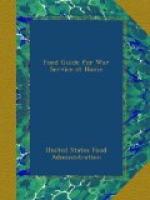Fats are very concentrated food, a fact which gives them added value in war-time, making them the most economical food to ship. A POUND OF ANY FAT GIVES 21/4 TIMES AS MUCH ENERGY AS A POUND OF SUGAR—the reason for the slogan “Fats Are Fuel for Fighters.” Soldiers engaged in the most strenuous physical activities need fuel for all the energy they expend. Bacon, butter, all the forms of fat give them the most energy in the smallest weight of food.
Fats stave off the feeling of hunger longer than other foods because they pass more slowly from the stomach and delay the passage of foods eaten with them. A slice of bread and butter will “satisfy” one for a much longer time than a slice of bread and jelly, even though there is enough jelly to give exactly the same amount of fuel. In the countries in which there is a fat shortage, the appetite does not stay satisfied during the usual period between meals, even when the previous meal contained the customary amount of calories. The feeling of hunger is sometimes almost constant.
Certain fats are valuable for an entirely different reason. Milk fat, either in the milk or as butter, beef fat which is a constituent of oleomargarine, the fat in the yolk of egg, all contain one of the vitamines needed by children in order to grow properly, and by grown people to keep in good health. Lard and the vegetable fats and oils, like nut or vegetable margarine and cottonseed-oil, do not contain this substance, but if there is sufficient milk in the diet, there will be plenty of this “fat-soluble vitamine.” In all other respects the fats are alike from a nutritional standpoint. One fat can replace another without harm.
Until the war came there was little need of knowing or bothering as to what kind of fats we ate, or of concerning ourselves with the fact that many more varieties were available than most of us used. Now it does make a decided difference. OUR ARMIES AND THOSE OF THE ALLIES NEED FAT, A GREAT DEAL OF IT, AND WE MUST SHIP THEM THE KIND MOST SUITED TO THEIR PURPOSES. WE CAN USE WHAT THE ALLIES AND THE ARMY DO NOT NEED.
THE SITUATION ABROAD
There is a shortage of the animal fats, lard, butter, and oleomargarine for the same reasons, of course, that cause the meat shortage. England, particularly recently, has had very little, less even than the French and Italians, who are not accustomed to using much.
England was the largest butter importer in the world, getting her supply mostly from northwestern Europe, Denmark, Russia, Sweden, and Holland. Russia can no longer supply her. Neither can the neutrals, who have been supplying Germany under pressure; they need Germany’s coal. Although the United States has increased her butter exports to the United Kingdom, if our entire exports went to them, it would supply only 6 per cent of the amount needed.




